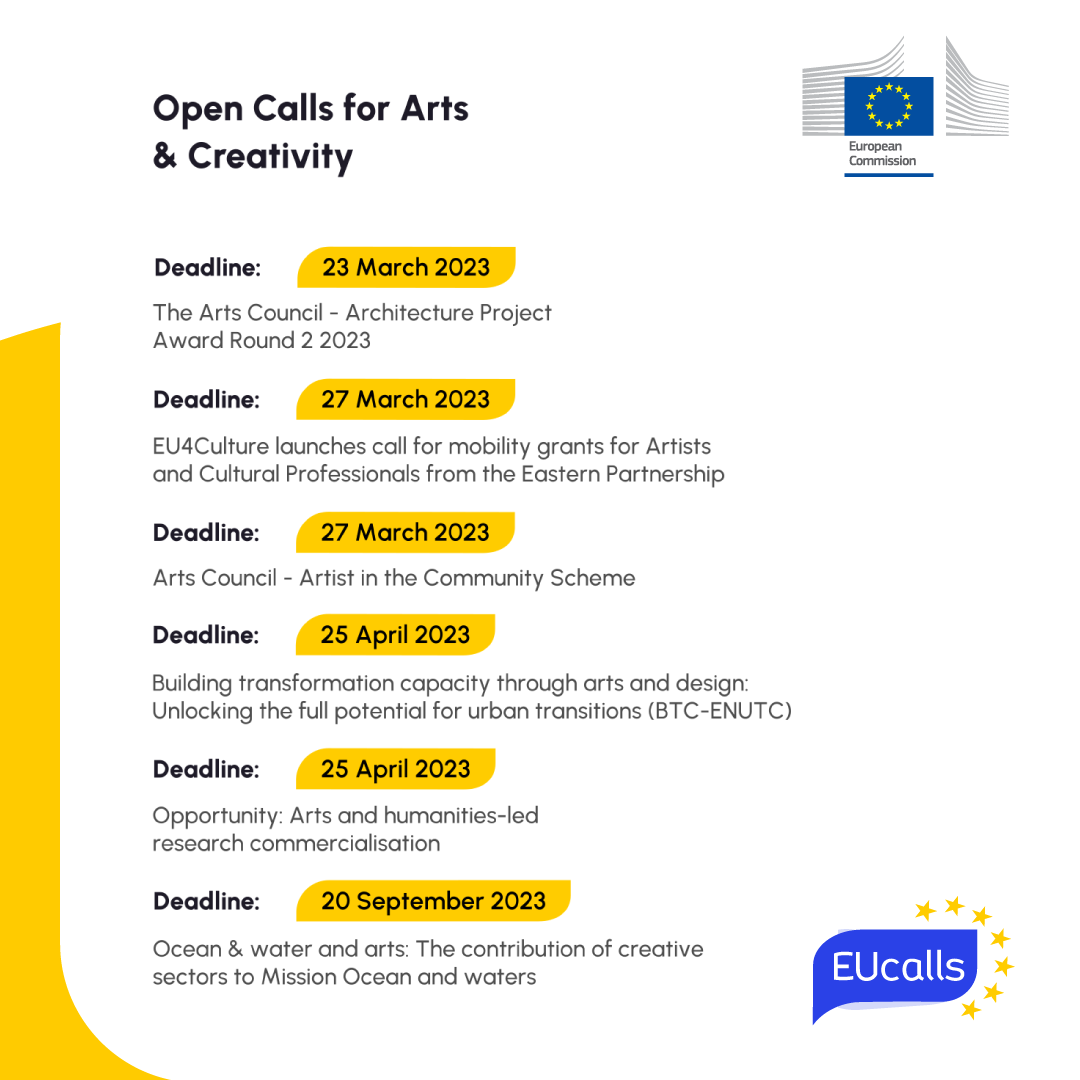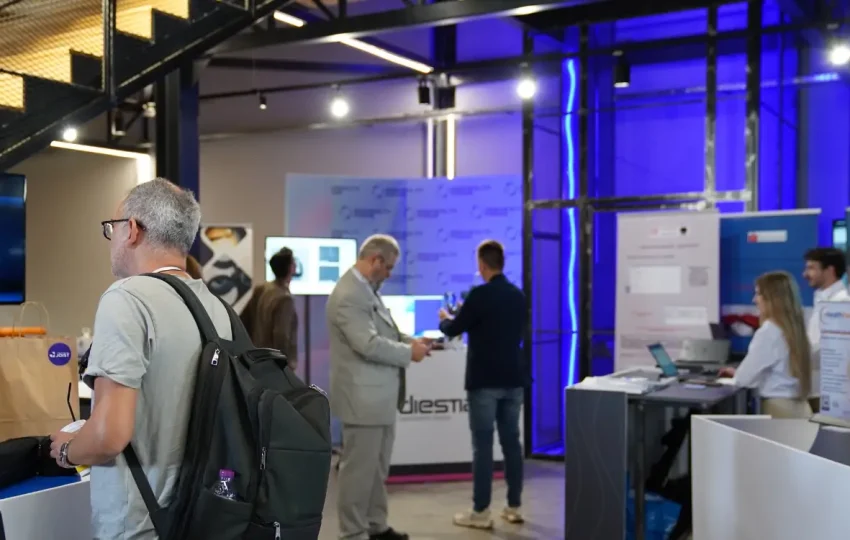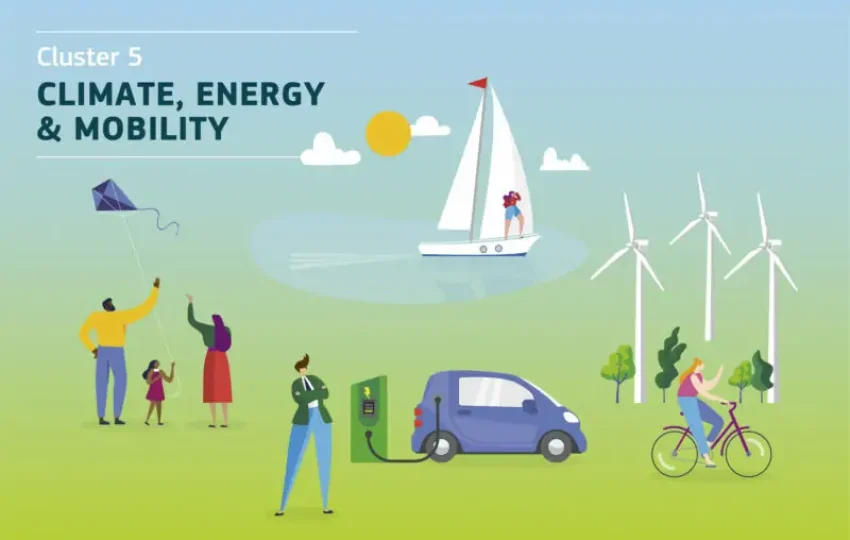The European Union (EU) is committed to supporting innovation and growth in the creative sectors through various funding opportunities. From artists and designers to cultural organisations and entrepreneurs, the EU offers a range of funding programs to help professionals in the creative industries realise their ideas and achieve their goals.
This article has compiled a list of currently open calls for funding for European creatives to start their own creative projects. Whether you’re looking to start a new project, expand an existing one, or connect with other creatives, these opportunities could provide the financial support and resources you need to take your work to the next level. So, if you’re a creative professional looking for funding, read on to discover the many ways the EU can help you achieve your vision.

The Arts Council – Architecture Project Award Round 2 2023
Strand 1: Research and Development
The purpose of this strand is to offer applicants an opportunity to explore, test and develop ideas in architecture that relate to and could be developed into Strand 2 (Production) OR Strand 3 (Engagement) projects.
Ideas for projects developed under Strand 1 are eligible to apply for Strand 2 or Strand 3 funding, as appropriate, in a subsequent year.
It is a requirement of this strand that an architect or architecture graduate is the applicant OR a core member of the team in a group application – e.g. in an application from a curator, community group, festival, arts centre, local authority, etc. (in the case of an application that could be developed into a Strand 3 Engagement project).
Strand 2: Production
The purpose of this strand is to support once-off ambitious new work from architects or architecture graduates at all career stages in or about architecture through the creation of spatial, material or other physical work that has a real and tangible output that can be experienced by the public (in a public space in the case of built or material work).
Potential proposals could be those that:
- Enable the production of work in architecture that is challenging and embraces artistic and creative risk
- Enable the exploration and/or testing of creative ideas in architecture
- Develop and expand the critical discourse on architecture as an art form (e.g. through writing, film, etc.).
It is a requirement of this strand that applicants must be architects or architecture graduates.
Strand 3: Engagement
The purpose of this strand is to support the delivery of high-quality once-off projects that are ambitious, innovative, and creative and that specifically aim to enhance and extend the public’s experience of, and involvement with, architecture (e.g. exhibitions, events, festivals and programmes).
Potential proposals under this strand could be those that:
- Deliver a clearly devised project or programme with the central objective of engaging the public with architecture
- Are innovative and ambitious in the ways in which architecture is exhibited, mediated, communicated, debated or presented.
It is a requirement of this strand that an architect or architecture graduate is the applicant OR a core member of the team in a group application.
Find more information here.
Deadline: 23/03/2023
Eu4culture Launches Call For Mobility Grants for Artists and Cultural Professionals From the Eastern Partnership
The EU-funded EU4Culture project announces its 3rd call for mobility grants to support artists and cultural professionals from the Eastern Partnership countries: Armenia, Azerbaijan, Belarus, Georgia, the Republic of Moldova, and Ukraine.
The EU4Culture Mobility grants are open for internships, study visits, conferences, professional development, and other activities that foster knowledge exchange and intercultural dialogue.
The competition is open to artists or cultural professionals from all cultural sectors. They must be citizens or legal residents of these countries over the age of 18. The competition offers special opportunities to applicants residing in non-capital cities.
The call supports four types of mobilities:
- Short-term mobilities (5-10 calendar days) – up to €1,500;
- Medium-term mobilities (up to 5 weeks) – up to €3,500;
- Long-term mobilities (up to 12 weeks) – up to €5,000;
- Virtual Mobilities (online participation) – up to €1,000.
Mobility projects can be implemented between 1 June 2023 and 31 May 2024 in the EU member states, EU partner countries and other European countries.
To apply for the EU4Culture Mobility grants, applicants must submit an action plan and budget for their proposed international mobility through the Goethe Application Portal (GAP).
Deadline: 27/03/2023
Arts Council – Artist in the Community Scheme
Twice yearly, the Arts Council offers grants to enable artists and communities of place/or interest to work together on projects.
The scheme is open to artists from any of the following artform disciplines: architecture, circus, street art and spectacle, dance, film, literature (Irish and English language), music, opera, theatre, visual arts and traditional arts. The projects can take place in a diverse range of social and community contexts, e.g. arts and health; arts and disability; arts and older people; arts and cultural diversity.
The aim of the AIC scheme is to encourage meaningful collaboration between communities of place and/or interest and artists. It is essential that consultation take place between the artist and the community so that both parties are involved in deciding on the nature of the project’s realisation. Group ownership of the art should be maintained at every stage.
Deadline: 27/03/2023
Building Transformation Capacity Through Arts and Design: Unlocking the Full Potential for Urban Transitions (BTC-ENUTC)
The purpose of the call “Building Transformation Capacities through arts and design: Unlocking the full potential for urban transitions” is to fund projects that focus on impact creation and implementation that Build Urban Transformation capacities inspired by the new perspectives, methodologies and approaches connected to the EU initiatives: the New European Bauhaus and the EU Mission: Climate Neutral and Smart Cities. In this call, we use the same definition of Urban Transformation Capacities as in the first call ENUTC call: as the process of building capacities such as skills, insights, tools, organisational and personal capabilities, working methods and processes, access to experiences and verifiable knowledge.
The aim of the call is to fund projects that are building transformation capacities towards climate-neutral and sustainable cities by 2030 and that rely on aesthetic perspectives and approaches in terms of design, form architecture, art and cultural heritage and new forms of governance and collaboration, as well as by engaging citizens. The culture and creative sector, with artists, designers and/or other actors, are important to resolve societal challenges. Scientists and practitioners from the culture and creative sector or from other disciplines need each other to resolve these complex urban transitions.
Deadline: 25/04/2023
Opportunity: Arts and Humanities-Led Research Commercialisation
Apply for funding as part of AHRC’s first dedicated commercialisation opportunity as part of our commitment to increasing support for research commercialisation across the arts and humanities.
Proposals can:
- follow on from any previously UK Research and Innovation (UKRI)-funded research in the last 24 months
- be from any discipline but must significantly involve the arts and humanities
Successful applicants will influence the development of future AHRC commercialisation programmes.
AHRC will fund 80% of the full economic cost of the project, which can be up to £50,000, with a maximum duration of 1 year.
Learn more about this EU funding opportunity for creatives here.
Deadline: 25/04/2023
Ocean & Water and Arts: The Contribution of Creative Sectors to Mission Ocean and Waters
Art and creative sectors can play an important role in the mobilisation of citizens, stakeholders and civil society actors, such as NGOs and the philanthropic community, for the protection and restoration of the ocean and inland waters, their biodiversity, and aesthetic and cultural heritage. Creative activities can also play an important role in addressing the challenges of coastal areas, thus contributing to the New Bauhaus initiative. In this context, this action should bring together citizens, museums, aquaria, research institutions, engineers, architects, civil society and citizens with artists and other creative sectors to foster interdisciplinary experimentation and entrepreneurship. Such undertakings should benefit from close cooperation with the scientific community and philanthropists.
Mobilisation, cooperation and coordination should be envisaged at the interregional/transnational level. Proposals are encouraged to build synergies with relevant activities supported under the Creative Europe programme and with other New European Bauhaus projects, notably those based in coastal and maritime regions.
Proposals should include at least three calls for the selection of art and creative sector projects, which will be supported through Financial Support to Third Parties under this topic. The entities implementing the arts and creative sector projects shall be the recipient of the financial support, which should be used exclusively for the implementation of the project.
Deadline: 20/09/2023
Don’t miss out on the many EU funding opportunities available to creative professionals! If you haven’t done so, register now at EUcalls to find even more relevant opportunities and partners to collaborate with. By joining the platform, you’ll gain access to a wide network of like-minded creatives, funding programmes, and resources to help you bring your ideas to life. Register today and explore how the EU can support your creative endeavours!


